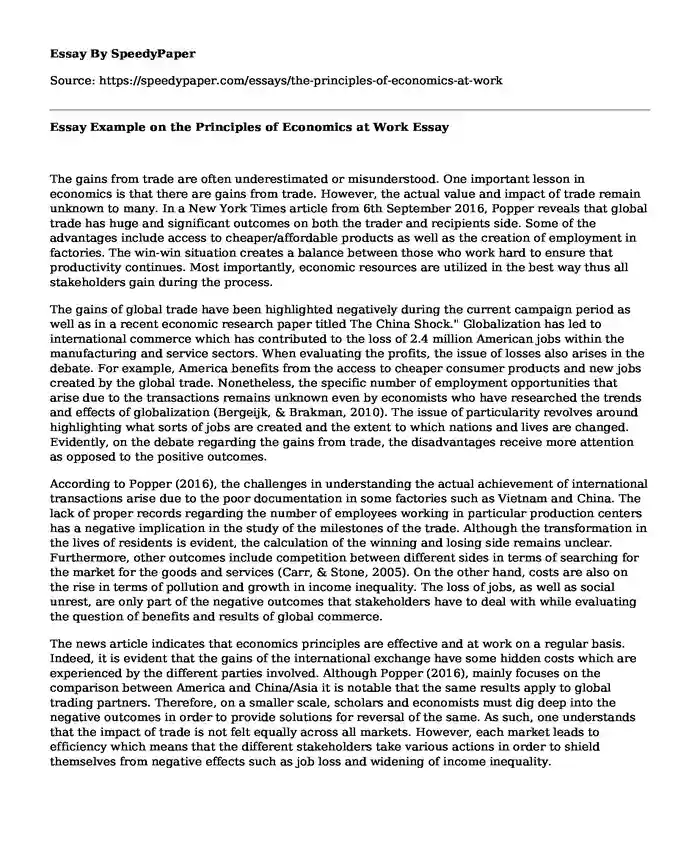
| Type of paper: | Essay |
| Categories: | Globalization Economics |
| Pages: | 3 |
| Wordcount: | 606 words |
The gains from trade are often underestimated or misunderstood. One important lesson in economics is that there are gains from trade. However, the actual value and impact of trade remain unknown to many. In a New York Times article from 6th September 2016, Popper reveals that global trade has huge and significant outcomes on both the trader and recipients side. Some of the advantages include access to cheaper/affordable products as well as the creation of employment in factories. The win-win situation creates a balance between those who work hard to ensure that productivity continues. Most importantly, economic resources are utilized in the best way thus all stakeholders gain during the process.
The gains of global trade have been highlighted negatively during the current campaign period as well as in a recent economic research paper titled The China Shock." Globalization has led to international commerce which has contributed to the loss of 2.4 million American jobs within the manufacturing and service sectors. When evaluating the profits, the issue of losses also arises in the debate. For example, America benefits from the access to cheaper consumer products and new jobs created by the global trade. Nonetheless, the specific number of employment opportunities that arise due to the transactions remains unknown even by economists who have researched the trends and effects of globalization (Bergeijk, & Brakman, 2010). The issue of particularity revolves around highlighting what sorts of jobs are created and the extent to which nations and lives are changed. Evidently, on the debate regarding the gains from trade, the disadvantages receive more attention as opposed to the positive outcomes.
According to Popper (2016), the challenges in understanding the actual achievement of international transactions arise due to the poor documentation in some factories such as Vietnam and China. The lack of proper records regarding the number of employees working in particular production centers has a negative implication in the study of the milestones of the trade. Although the transformation in the lives of residents is evident, the calculation of the winning and losing side remains unclear. Furthermore, other outcomes include competition between different sides in terms of searching for the market for the goods and services (Carr, & Stone, 2005). On the other hand, costs are also on the rise in terms of pollution and growth in income inequality. The loss of jobs, as well as social unrest, are only part of the negative outcomes that stakeholders have to deal with while evaluating the question of benefits and results of global commerce.
The news article indicates that economics principles are effective and at work on a regular basis. Indeed, it is evident that the gains of the international exchange have some hidden costs which are experienced by the different parties involved. Although Popper (2016), mainly focuses on the comparison between America and China/Asia it is notable that the same results apply to global trading partners. Therefore, on a smaller scale, scholars and economists must dig deep into the negative outcomes in order to provide solutions for reversal of the same. As such, one understands that the impact of trade is not felt equally across all markets. However, each market leads to efficiency which means that the different stakeholders take various actions in order to shield themselves from negative effects such as job loss and widening of income inequality.
References
Bergeijk, P. & Brakman, S. (2010). The gravity model in international trade. Cambridge: Cambridge University Press.
Carr, I. & Stone, P. (2005). International trade law. London: Cavendish Pub.
Popper, N. (2016). How Much Do We Really Know About Global Trades Impacts?. Nytimes.com. Retrieved 15 September 2016, from http://www.nytimes.com/2016/09/11/magazine/how-much-do-we-really-know-about-global-trades-impacts.html?ref=economy
Cite this page
Essay Example on the Principles of Economics at Work. (2019, Oct 29). Retrieved from https://speedypaper.com/essays/the-principles-of-economics-at-work
Request Removal
If you are the original author of this essay and no longer wish to have it published on the SpeedyPaper website, please click below to request its removal:
- Learner Autonomy Research, Free Essay Sample
- Essay Sample on American History
- Marketing Essay Example on Importance of UPS Logo Change
- Should Scientists Be Cut Out of the Policy Making Process? Essay Example
- Medicine Essay Sample: Pediatric Infections Diagnosis
- ISI Supporting Taliban - Free Essay Example
- Essay Sample: Examining Nike Inc.'s Global Processes and Impact on the World
Popular categories




